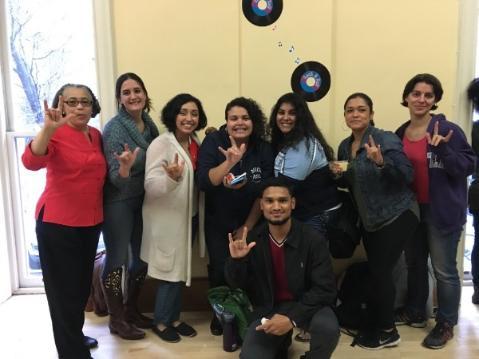Mission Statement
The mission of the Program in the Education of the d/Deaf and Hard of Hearing is to prepare scholarly professionals who will approach teaching, learning, and research as a dialogic, ever-evolving, life-long process of inquiry. The Program seeks to prepare pre-service, in-service, and leadership personnel so that they might become knowledgeable about and actively engaged in research concerning the personal, social, cultural, and pedagogical ramifications associated with being d/Deaf or having a hearing loss. It seeks to educate these pre-service, in-service, and leadership personnel in various research methodologies (both quantitative as well as qualitative) in order to explore new and enduring questions concerning the lives, well-being, and pedagogy of individuals who are d/Deaf or hard of hearing.
The program recognizes and respects the notion of diversity: racial and ethnic, as well as, linguistic diversity. Furthermore, it recognizes that diversity exists not only between and among cultures and groups of individuals, but also within them. As for the population of individuals who are d/Deaf or hard of hearing, we recognize that it, too, is extremely diverse. As a result, the students in the program are expected to be knowledgeable about, and accepting of notions and skills associated with the listening and spoken language, Cued Speech, total communication, sign-supported speech, and bilingual-bicultural approaches to teaching d/Deaf and hard of hearing students, including issues relating to Deaf culture, American Sign Language, and other signing systems.
Given these notions, the program holds to a number of beliefs:
- We believe that no "single answer" exists with regard to the "correct” pedagogical approach or communication system that should be used with d/Deaf and hard-of-hearing students. As a consequence, we feel that one should fit methods and communication systems to children and not children to methods or communication systems.
- We believe that personal growth and growth within the profession are best fostered by building communities of individuals engaged in critical thought, critical dialogue, and research, while promoting open-mindedness and a tolerance for differences in belief systems.
- We believe that literacy is one of the primary goals in the education of all individuals who are d/Deaf or hard of hearing. Reflected in this notion is the belief that all individuals, including those who are d/Deaf or hard of hearing, are meaning makers. Thus, the program strongly adheres to a constructivist philosophy that is student-centered and emphasizes authentic learning, the teacher-as-researcher/scholar model of classroom inquiry, literacy development, and applied linguistics in the education of individuals who are d/Deaf or hard of hearing.
It is our belief that adhering to this philosophy involves: 1) establishing a substantial theoretical and scientific research base of knowledge, and 2) providing for the practical application of these notions to the acquisition of language, communication skills, reading, writing, and content subjects that are applicable to all children including those that hear and those that are d/Deaf or hard of hearing, regardless of their preferred communication system.
